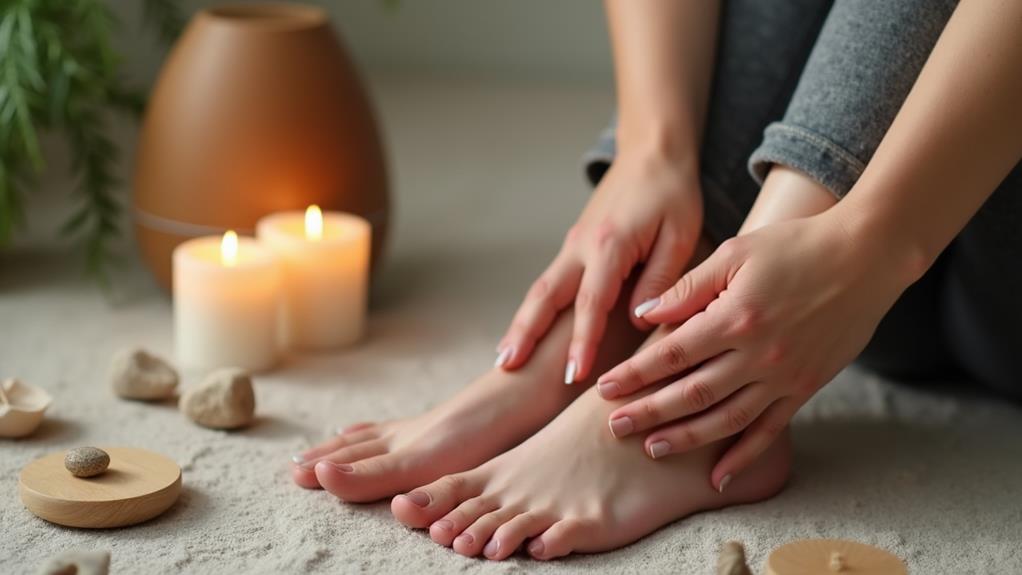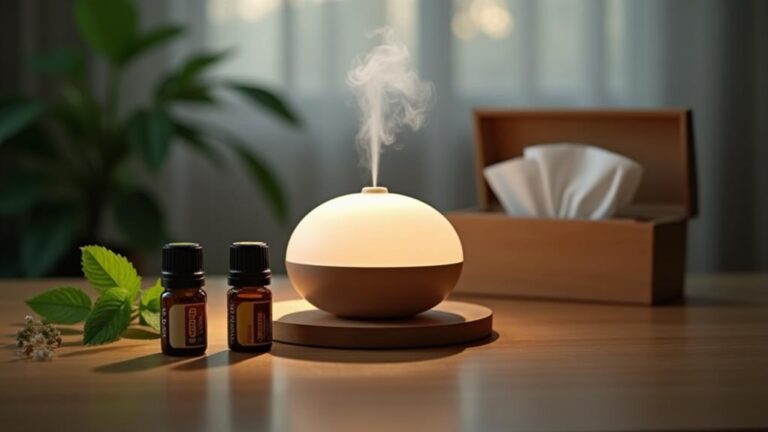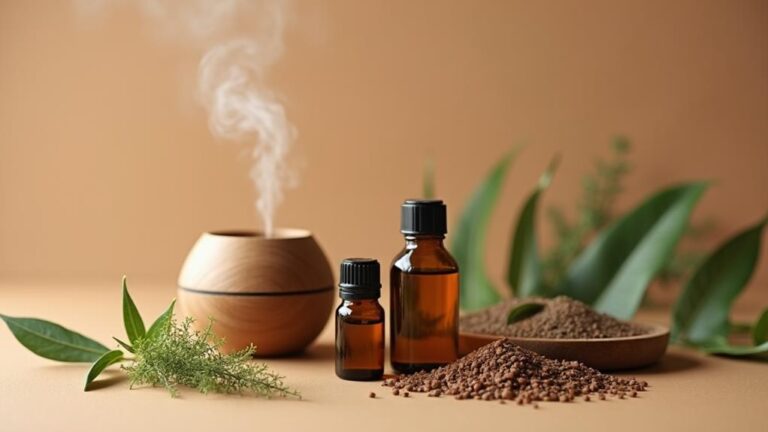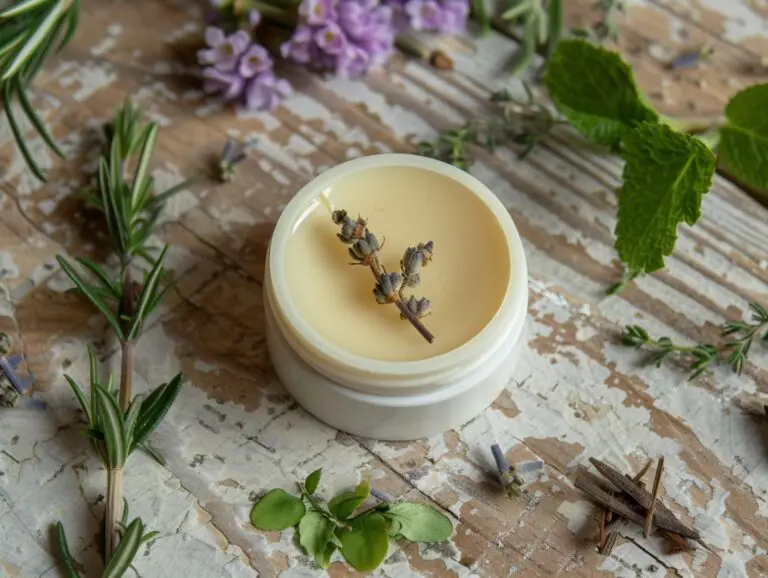As you navigate the challenges of living with arthritis, you're likely no stranger to the frustration of persistent pain and stiffness. You've probably tried various treatments, from medication to physical therapy, but still find yourself searching for additional relief. That's where aromatherapy comes in – a natural, non-invasive approach that's gaining recognition for its potential to alleviate arthritis symptoms. By harnessing the therapeutic properties of essential oils, you may be able to reduce your pain, inflammation, and stress levels, and improve your overall quality of life. But how exactly does aromatherapy work, and which oils are most effective for arthritis relief?
Key Takeaways
- Aromatherapy is a complementary approach to managing arthritis symptoms, not a replacement for conventional treatments.
- Essential oils can be inhaled, applied topically, or used in bathwater to alleviate arthritis symptoms and stimulate healing.
- Certain oils, such as lavender and chamomile, promote relaxation and reduce anxiety, while others, like eucalyptus, have analgesic properties.
- Aromatherapy blends, like Pain-Relief Blend and Inflammation-Reducing Blend, can target pain, inflammation, and stiffness in arthritis.
- Always dilute essential oils in a carrier oil and perform a patch test before using them to prevent irritation and allergic reactions.
Understanding Aromatherapy and Arthritis
When you're living with arthritis, managing pain and inflammation becomes a daily challenge.
You're likely no stranger to exploring various treatment options, from conventional medications to alternative therapies.
Aromatherapy, a practice with a rich aromatic history, has gained popularity as a complementary approach to managing arthritis symptoms.
As you explore the world of aromatherapy, it's crucial to understand that it's not a replacement for conventional treatments, but rather a complementary therapy that can enhance your overall well-being.
Aromatherapy involves the use of essential oils, derived from plants, to promote relaxation, reduce stress, and alleviate pain.
These oils can be inhaled, applied topically, or used in bathwater to stimulate the body's natural healing processes.
Benefits of Aromatherapy for Arthritis
You'll find that aromatherapy can bring significant relief to arthritis symptoms by reducing your pain levels, easing inflammation symptoms, and improving joint mobility.
By incorporating essential oils into your routine, you can potentially decrease your reliance on pain medication and experience greater comfort in your daily life.
As you explore the benefits of aromatherapy for arthritis, you'll discover how it can be a valuable complementary therapy to traditional treatments.
Reduces Pain Levels
Chronic pain, a hallmark of arthritis, can be debilitating and affect every aspect of your life.
Aromatherapy offers a holistic approach to managing this pain by influencing your brain's pain perception. By inhaling specific essential oils, you can alter the way your brain processes pain signals, reducing the sensation of discomfort. This can be particularly helpful in conjunction with traditional treatments.
Mental preparation plays a vital role in aromatherapy's pain-relieving effects.
When you're relaxed and calm, your body is more receptive to the therapeutic properties of essential oils. Certain scents, such as lavender and chamomile, promote relaxation and reduce anxiety, making them ideal for pre-treatment mental preparation.
Other oils, like eucalyptus and peppermint, have analgesic properties that can help alleviate pain directly.
Aromatherapy's impact on pain perception can also be attributed to its ability to distract you from discomfort.
The pleasant aroma of essential oils can shift your focus away from pain, providing a mental escape. By incorporating aromatherapy into your self-care routine, you can develop a more positive relationship with your body, reducing the emotional burden of chronic pain.
Eases Inflammation Symptoms
Managing arthritis pain often goes hand-in-hand with addressing inflammation, another key symptom of the condition.
You'll find that aromatherapy can be an effective way to ease inflammation triggers, reducing the discomfort and swelling associated with arthritis. When you incorporate natural remedies like essential oils into your routine, you can experience a significant decrease in inflammation.
Certain essential oils, such as frankincense, ginger, and turmeric, have potent anti-inflammatory properties that can help alleviate inflammation.
These oils can be used in various ways, including topical applications, inhalation, or added to a warm bath. By targeting inflammation at its source, you can reduce the frequency and severity of arthritis flare-ups.
Aromatherapy can also help you manage stress, a common inflammation trigger.
By promoting relaxation and reducing anxiety, you can break the cycle of stress and inflammation. By combining aromatherapy with other natural remedies and a healthy lifestyle, you can effectively manage inflammation and alleviate arthritis symptoms, improving your overall quality of life.
With aromatherapy, you can take a proactive approach to managing inflammation and find relief from arthritis symptoms.
Improves Joint Mobility
As you incorporate aromatherapy into your daily routine, you may notice a significant improvement in joint mobility, allowing you to move more freely and comfortably.
This is because essential oils have a profound impact on your body's physical and emotional well-being. Certain oils, such as eucalyptus, peppermint, and rosemary, have natural anti-inflammatory properties that can help reduce stiffness and pain in your joints, allowing you to move with greater ease.
Regular aromatherapy sessions can also promote muscle relaxation, which is essential for maintaining joint flexibility.
When your muscles are relaxed, your joints are able to move more freely, reducing the risk of injury and strain. Additionally, aromatherapy can help reduce stress and anxiety, which can exacerbate arthritis symptoms.
By combining aromatherapy with regular exercise and a healthy diet, you can improve your overall joint health and maintain a higher level of joint mobility.
This can greatly enhance your quality of life, allowing you to engage in activities you enjoy without feeling limited by your condition.
Essential Oils for Arthritis Relief
You're now ready to explore the essential oils that can help alleviate arthritis symptoms.
When it comes to reducing inflammation and pain, certain oils stand out for their therapeutic properties, such as wintergreen and eucalyptus.
Inflammation Reducing Oils
Several essential oils have potent anti-inflammatory properties that can help alleviate arthritis symptoms.
When used in combination with other holistic therapies, these oils can be a powerful tool in reducing inflammation and promoting overall well-being.
You can harness the anti-inflammatory essential properties of these oils by using them in aromatherapy blends.
Here are three oils you can use:
- Turmeric Essential Oil: Known for its potent anti-inflammatory compound curcumin, turmeric oil can help reduce inflammation and alleviate arthritis symptoms.
- Frankincense Essential Oil: With its anti-inflammatory and anti-arthritic properties, frankincense oil can help reduce joint pain and inflammation.
- Ginger Essential Oil: Ginger oil has anti-inflammatory compounds that can help reduce inflammation and alleviate arthritis symptoms.
When using these oils, consider creating oil synergies by blending them with other anti-inflammatory oils.
This can enhance their therapeutic effects and promote overall well-being.
Pain Relief Options
Your aromatherapy practice for arthritis relief isn't complete without exploring pain relief options.
As you plunge into the world of essential oils, you'll find that certain oils offer exceptional pain management benefits.
These natural remedies can be used in conjunction with other treatments to alleviate arthritis symptoms.
For pain relief, consider using essential oils with analgesic and anti-inflammatory properties.
Wintergreen oil, for example, contains methyl salicylate, a compound similar to aspirin that helps reduce pain and inflammation.
Birch oil, another option, contains salicin, which has been shown to reduce pain and inflammation.
Other essential oils, such as lavender and chamomile, can help promote relaxation and reduce anxiety, which can contribute to pain.
When using essential oils for pain management, crucially, dilute them with a carrier oil and apply them topically.
You can also inhale them through steam inhalation or use a diffuser.
By incorporating these natural remedies into your aromatherapy practice, you can effectively manage pain and promote overall well-being.
As you explore pain relief options, remember to always consult with a healthcare professional before using new essential oils.
Anti-Arthritis Oil Blends
By combining essential oils in carefully crafted blends, you can create powerful anti-arthritis formulas that target pain, inflammation, and stiffness.
When crafting your blends, consider the oil properties and how they work synergistically to alleviate arthritis symptoms.
For instance, anti-inflammatory oils like frankincense and turmeric can be combined with pain-relieving oils like wintergreen and peppermint.
- Pain-Relief Blend: Combine 2 parts wintergreen essential oil, 1 part peppermint essential oil, and 1 part frankincense essential oil to create a blend that targets pain and inflammation.
- Inflammation-Reducing Blend: Mix 2 parts turmeric essential oil, 1 part ginger essential oil, and 1 part cypress essential oil to create a blend that reduces inflammation and promotes healing.
- Stiffness-Relieving Blend: Blend 2 parts eucalyptus essential oil, 1 part rosemary essential oil, and 1 part lemon essential oil to create a blend that relieves stiffness and promotes circulation.
When creating your blends, start with a small batch and adjust the blend ratios as needed to achieve the desired therapeutic effect. Always dilute your blends with a carrier oil and perform a patch test before using them on your skin.
How to Use Aromatherapy Effectively
To fully harness the benefits of aromatherapy for arthritis, you'll need to incorporate it into your daily routine thoughtfully.
Start by understanding aromatherapy basics, including the properties of different essential oils and how they interact with your body.
Familiarize yourself with blending techniques to create unique combinations tailored to your needs. A basic understanding of the therapeutic properties of each oil will help you choose the right blends for your arthritis symptoms.
When combining oils, consider the 3-2-1 rule: three parts carrier oil, two parts secondary essential oil, and one part primary essential oil.
This ratio guarantees a balanced and safe application. Be mindful of the quality and concentration of your essential oils, as they can vary substantially.
Always dilute your essential oils in a carrier oil before applying them to the skin, as undiluted essential oils can be irritating.
Aromatherapy Methods for Relief
1. Aromatic Massage: This method involves massaging essential oils into your skin, which can help reduce pain and inflammation.
You can use a carrier oil like coconut or jojoba oil to dilute the essential oil and make it gentler on your skin.
2. Topical Application: Applying essential oils topically can be an effective way to target specific areas of pain.
You can use a roll-on applicator or add a few drops of essential oil to a warm bath for relaxation.
3. Inhalation: Inhaling essential oils can help reduce stress and anxiety, which can exacerbate arthritis symptoms.
You can use a diffuser or inhale the oil directly from a cloth or handkerchief.
Safe Practices for Aromatherapy
When you're ready to incorporate aromatherapy into your arthritis management plan, using these powerful oils wisely is crucial.
Aromatherapy guidelines and safety protocols can help you minimize risks and maximize benefits.
First, always dilute essential oils in a carrier oil before applying them to your skin, as undiluted oils can cause irritation and allergic reactions.
Next, perform a patch test on a small area of your skin before using a new essential oil to check for any adverse reactions.
Additionally, consult with a healthcare professional or a certified aromatherapist before using essential oils, especially if you're pregnant, breastfeeding, or taking medications.
Be cautious when using essential oils around children, pets, and people with allergies or sensitivities.
Store essential oils in a cool, dark place, away from heat sources and out of reach of children.
Always follow the recommended usage guidelines and start with small amounts to gradually increase as needed.
Creating a Personal Aromatherapy Plan
1. Identify your goals: What symptoms do you want to alleviate with aromatherapy?
Is it pain, inflammation, or stress? Understanding what you want to achieve will help you choose the right essential oils.
2. Explore different essential oils: Research and experiment with various essential oils to find the ones that work best for you.
Consider your personal preferences, such as scent and potency.
3. Customize your delivery methods: Choose the aromatherapy methods that fit your lifestyle, such as diffusing, topical application, or inhalation.
Consider your personal preferences and needs when selecting the best method for you.
Combining Aromatherapy With Other Therapies
As you integrate aromatherapy into your daily routine, you may find that its benefits are enhanced when combined with other therapies.
This holistic approach can amplify the positive effects of aromatherapy on your arthritis symptoms. Consider pairing aromatherapy with therapeutic massage, which can increase relaxation, reduce muscle tension, and improve joint mobility.
The gentle manipulation of soft tissues can also enhance the absorption of essential oils into the skin, allowing for deeper penetration and more effective relief.
In addition to massage, you may find that yoga, meditation, or physical therapy complement your aromatherapy practice.
These therapies can help improve flexibility, balance, and strength, while also reducing stress and anxiety. By incorporating multiple therapies into your routine, you can create an exhaustive approach to managing your arthritis symptoms.
Remember, every individual is unique, so experiment with different combinations to find what works best for you.
Frequently Asked Questions
Can I Use Aromatherapy if I'm Allergic to Certain Essential Oils?
If you're allergic to certain essential oils, you can still explore aromatherapy! Look for oil alternatives, like absolutes or CO2 extracts, and always do skin testing before using a new oil to guarantee you don't react adversely.
How Long Does It Take to Notice Results From Aromatherapy for Arthritis?
You'll be amazed at how quickly you'll start feeling like a new person! Typically, it takes 2-6 weeks of consistent aromatherapy treatment to notice significant results, but diligent symptom tracking will help you pinpoint progress in as little as 7-10 days.
Can I Use Aromatherapy if I'm Taking Prescription Medications?
When taking prescription medications, you should exercise caution with aromatherapy, as certain essential oils can interact with meds or exacerbate conditions; always consult your doctor about medication interactions and prescription precautions before incorporating aromatherapy into your wellness routine.
Are There Any Age Restrictions for Using Aromatherapy for Arthritis?
You won't find specific senior exemptions or age limitations for using aromatherapy, but you should consult a healthcare professional before starting, especially if you're under 18 or over 65, as individual responses may vary, and they can guide you on safe usage.
Can I Use Aromatherapy on Open Wounds or Broken Skin?
When caring for your skin, you're wise to prioritize wound safety and skin sensitivity. You shouldn't use aromatherapy on open wounds or broken skin, as essential oils can irritate or delay healing; instead, focus on gentle, topical applications on intact skin.
Conclusion
As you incorporate aromatherapy into your daily routine, you'll discover a profound impact on your arthritis symptoms. Research suggests that our sense of smell is closely linked to the brain's emotional centers, releasing endorphins that naturally reduce pain and inflammation. By harnessing the power of essential oils, you can tap into this natural healing response, promoting relaxation, reducing stress, and alleviating arthritis symptoms.














